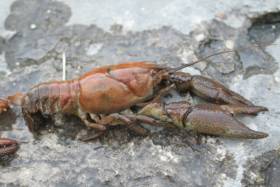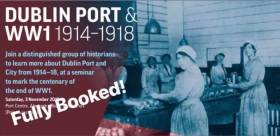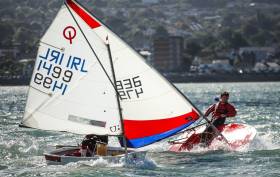Displaying items by tag: Seminar
"Seafarer Wellness" Seminar at National Maritime College of Ireland, Ringaskiddy, Cork Harbour – 7th October
A seminar on “Seafarer Wellness” is to held at the National Maritime College of Ireland (NMCI), Ringaskiddy, Cork Harbour with the event taking place on Friday, 7 October.
The organisers of the event, The Nautical Institute (Ireland Branch), the Irish Institute of Master Mariners in association with the Dept. of Maritime Studies – NMCI invite you to join a Seminar on “Seafarer Wellness” which takes place from 0900 – 1700.
To register, please make your interest known with the Nautical Institute (Ireland Branch) by emailing: [email protected]
The seminar is open for anyone to attend but if you would like to be an official delegate with included catering, there will be a small charge of €20.
The Irish Institute of Master Mariners (IIMM) is a professional body of Ship Masters promoting safe, efficient and professional conduct in maritime operations in Ireland and internationally.
For any further updates visit IIMM and social media accounts.
Galway Hosts Irish Crayfish Seminar Next Month
The Marine Institute in Oranmore, Co Galway will host an Irish Crayfish Seminar on Tuesday 21 and Wednesday 22 May in response to recent outbreaks of crayfish plague in Ireland’s waterways.
A series of talks by invited speakers from across Ireland and Europe will cover many aspects of crayfish ecology and what is known about the disease.
The latest international and national research findings will be presented on the broad topics of:
- Irish crayfish in national, all Ireland and European contexts.
- Ecology of white-clawed crayfish in Ireland.
- Crayfish plague: What is it? How did it get here? What can we do about it?
- Crayfish plague in Europe: What can we learn from the European experience?
- Biosecurity: its importance and practical advice on safe, clean working.
The event is free but booking is essential. Resigter online before 5pm on Monday 13 May.
An outline of the two-day seminar with confirmed speakers is available to read or download HERE.
Centenary Seminar On the End of WW1: The Story of Dublin Port & City 1914-18 (Fully Booked) But More Events Planned!
#DublinPort - A seminar to mark the centenary of the end of WW1 is to be held in the Dublin Port Company's Port Centre building on Alexandra Road, tomorrow, Saturday, 3 November.
The event held in advance of the 100th anniversary of Armistice Day, is to involve talks from distinguished historians who will tell the story of Dublin Port and City from 1914-18.
TAKE NOTE: At this stage, please be advised the ticketed event is fully booked out!
For those of you who missed out this time, Dublin Port Company draws your attention to keep an eye on their Facebook page (click here) for more planned great historical seminars.
Background to Seminar on World War 1
From 1914 to 1923 the Irish people endured ten years of intense military activity, including participation in a World War, an urban insurrection, a Guerrilla War and finally a bitter Civil War.
The Result was a new nation bearing both the hopes of many of its citizens, and the pain left by the wars that had brought it into being. When Europe went to war in 1914, Ireland (as part of the British Empire) was automatically involved.
Over the course of the war, about 150,000 Irishmen volunteered to fight in the British Army and 30,000 were killed. The motives of the individual soldiers for enlisting varied and 59 members of the Dublin Port & Docks Board served in the Royal Navy and British Army, 4 of whom died.
At the same time the Dublin Dockyard Company opened a shell factory employing local women.
.
ISA Youth Seminar Dates 'Postponed' Til 2017
The first of the new ISA Junior Sailing Performance Seminars was postponed last month and will now take place at a date to be announced in 2017. As Afloat.ie reported in September the ISA announced that the seminars were replacing the ISA Optimist Squads and ISA Topper Squad which have traditionally run from October to March.
The ISA said at the launch of the new initiative: 'Given our limited resources we feel this approach will give a better return on investment while at the same time giving the pathway much more visibility across a wider base'.
Scheduled for the Irish Institute of Sport last weekend the first of three winter seminars was aimed at 'junior sailors of all classes born between 2001 and 2004 who are passionate about their sailing and want to learn important skills which will help with their overall development in the sport'.
No reason has been given as to why the October date was postponed by the ISA on its website here.
The seminars aim to educate sailors about the ISA pathway and help sailors understand their options and choices when graduating through the different sailing classes.
The opening seminar will focus on education of the sailor in areas outside the technical skills of sailing their chosen class. Topics covered at the seminar will include –
The cost of the first weekend seminar is €50 per sailor.
Seabed Mapping Seminar In Galway Next Week
#INFOMAR - Galway’s Marine Institute hosts the 2016 Seminar for INFOMAR – Integrated Mapping for the Sustainable Development of Ireland’s Marine Resource – next Wednesday 19 October.
With a focus on ‘collectively creating an INFOMAR legacy’, the free day-long event will look back on the development and impact of seabed mapping in Ireland, as well as plans for completion of the coastal and shelf-mapping project, and optimising the use and value of knowledge gained from mapping data.
The morning’s two main sessions include a ‘birds eye view’ of mapping the seas of Ireland’s Exclusive Economic Zone, and exploring the latest mapping technology for coastal development and management.
Afternoon presentations will also look at INFOMAR’s role the in energy, infrastructure, environment and education sectors.
The full seminar agenda is online, and free registration is available HERE.

































































